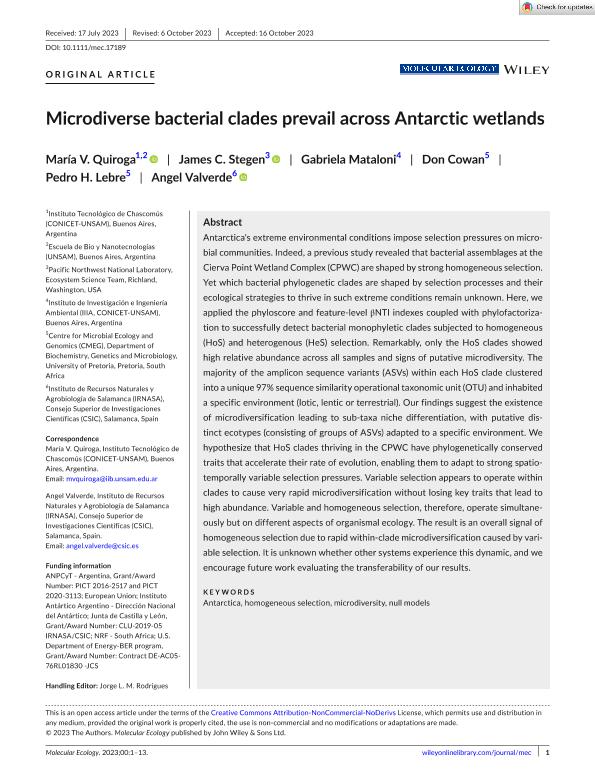Artículo
Microdiverse bacterial clades prevail across Antarctic wetlands
Quiroga, María Victoria ; Stegen, James C.; Mataloni, Maria Gabriela
; Stegen, James C.; Mataloni, Maria Gabriela ; Cowan, Don; Lebre, Pedro H.; Valverde, Angel
; Cowan, Don; Lebre, Pedro H.; Valverde, Angel
 ; Stegen, James C.; Mataloni, Maria Gabriela
; Stegen, James C.; Mataloni, Maria Gabriela ; Cowan, Don; Lebre, Pedro H.; Valverde, Angel
; Cowan, Don; Lebre, Pedro H.; Valverde, Angel
Fecha de publicación:
11/2023
Editorial:
Wiley Blackwell Publishing, Inc
Revista:
Molecular Ecology
ISSN:
0962-1083
Idioma:
Inglés
Tipo de recurso:
Artículo publicado
Clasificación temática:
Resumen
Antarctica's extreme environmental conditions impose selection pressures on microbial communities. Indeed, a previous study revealed that bacterial assemblages at the Cierva Point Wetland Complex (CPWC) are shaped by strong homogeneous selection. Yet which bacterial phylogenetic clades are shaped by selection processes and their ecological strategies to thrive in such extreme conditions remain unknown. Here, we applied the phyloscore and feature-level βNTI indexes coupled with phylofactorization to successfully detect bacterial monophyletic clades subjected to homogeneous (HoS) and heterogenous (HeS) selection. Remarkably, only the HoS clades showed high relative abundance across all samples and signs of putative microdiversity. The majority of the amplicon sequence variants (ASVs) within each HoS clade clustered into a unique 97% sequence similarity operational taxonomic unit (OTU) and inhabited a specific environment (lotic, lentic or terrestrial). Our findings suggest the existence of microdiversification leading to sub-taxa niche differentiation, with putative distinct ecotypes (consisting of groups of ASVs) adapted to a specific environment. We hypothesize that HoS clades thriving in the CPWC have phylogenetically conserved traits that accelerate their rate of evolution, enabling them to adapt to strong spatio-temporally variable selection pressures. Variable selection appears to operate within clades to cause very rapid microdiversification without losing key traits that lead to high abundance. Variable and homogeneous selection, therefore, operate simultaneously but on different aspects of organismal ecology. The result is an overall signal of homogeneous selection due to rapid within-clade microdiversification caused by variable selection. It is unknown whether other systems experience this dynamic, and we encourage future work evaluating the transferability of our results.
Palabras clave:
ANTARCTICA
,
HOMOGENEOUS SELECTION
,
MICRODIVERSITY
,
NULL MODELS
Archivos asociados
Licencia
Identificadores
Colecciones
Articulos (IIIA)
Articulos de INSTITUTO DE INVESTIGACION E INGENIERIA AMBIENTAL
Articulos de INSTITUTO DE INVESTIGACION E INGENIERIA AMBIENTAL
Articulos(CCT - LA PLATA)
Articulos de CTRO.CIENTIFICO TECNOL.CONICET - LA PLATA
Articulos de CTRO.CIENTIFICO TECNOL.CONICET - LA PLATA
Citación
Quiroga, María Victoria; Stegen, James C.; Mataloni, Maria Gabriela; Cowan, Don; Lebre, Pedro H.; et al.; Microdiverse bacterial clades prevail across Antarctic wetlands; Wiley Blackwell Publishing, Inc; Molecular Ecology; 11-2023; 1-13
Compartir
Altmétricas



